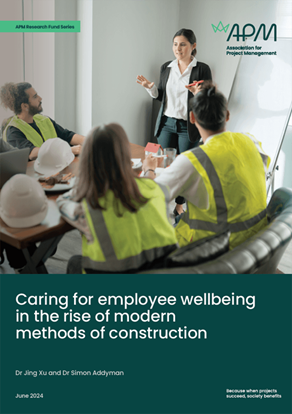
Industry experts are calling for collaborative action from employers in the project management field to improve employee wellbeing, particularly for project managers within the construction sector. This follows new research from the Association of Project Management (APM) examining how project-based firms address employee wellbeing while implementing modern methods of construction.
The research findings are detailed in Caring for Employee Wellbeing in the Rise of Modern Methods of Construction, conducted by Dr Jing Xu and Dr Simon Addyman, both associate professors at the Bartlett School of Sustainable Construction at University College London (UCL).
Attention to wellbeing management in project professions is increasing, spurred by rising reports of fatigue, stress and burnout among employees in projects and project-based businesses. The study reveals that the advent of modern methods of construction has altered working practices, decision-making and interaction methods to boost productivity and environmental sustainability. However, the human aspect, particularly employee wellbeing, has not received adequate attention.
Dr Xu said, “Our research highlights that in construction, as in many sectors, wellbeing encompasses leading a decent and meaningful life, including one’s work life. Unfortunately, under the current work culture, many organisations do not view creating a meaningful work life and positive employee wellbeing as an ethical imperative.”
Dr Xu pointed out the unique challenges project-based organisations face in managing wellbeing compared to other types of organisations. The temporary nature of projects makes it harder to build genuine relationships, often leading to feelings of loneliness among workers, which can be exacerbated by a highly competitive environment.
The research offers five strategic recommendations for organisations to proactively address the impact of their activities on employee wellbeing:
- Recognise wellbeing as an intrinsic value proposition for project workers.
- Establish strategic leadership for wellbeing integration within project-based firms and client organisations.
- Improve systems integration and cooperation between functions and at the firm-project interface.
- Enhance diversity and inclusion management for care and wellbeing.
- Support bottom-up learning and employee-oriented initiatives.
Dr. Xu advocates for a collaborative approach to successfully implement these recommendations: “A systematic approach and joint action across organisations are essential,” she says, “For instance, recognising wellbeing as an intrinsic value requires a complete transformation in project organisation and operations, including relationship-building with employees, procurement processes and project planning and control.”
